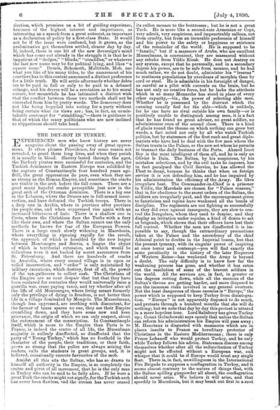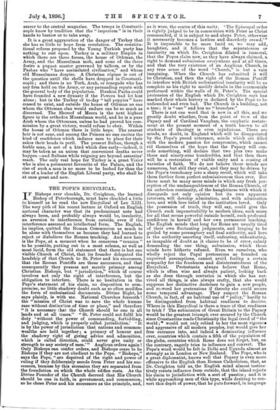THE DRY-ROT ENT TURKEY.
XPERIENCED men who know history are never sanguine about the passing away of great oppres- sions. It often pleases Providence, for some reason not revealed, to grant them long lives, and when they perish it is usually in blood. Slavery lasted through the ages, the Barbary pirates were successful for centuries, and the Turkish dominance in Eastern Europe was solidified by the capture of Constantinople four hundred years ago. Still, the great oppressions do pass, even when they are as strong as the Roman Empire, and sometimes the cracks are visible in the arch before the fall comes. There are a good many hopeful cracks perceptible just now in the great arch of the Ottoman dominion. There is a big one in the Lebanon, where the Druses are in full-armed insur- rection, and have defeated the Turkish troops. There is a deep one in Arabia, where in province after province the people rise, and when suppressed rise again with an increased bitterness of hate. There is a shallow one in Crete, where the Christians face the Turks with a fury like their own, and where the Sultan cannot use the only methods he knows for fear of the European Powers. There is a large crack slowly widening in Macedonia., where everything is ripening rapidly for the revolt, the approach of which is heralded by the new league between Montenegro and Servia, a league the object of which is territorial extension, and which would be ridiculous were it not backed by secret assurances from St. Petersburg. And there are hundreds of cracks in Anatolia, where every second village is in open or veiled insurrection, and "order" is only maintained by ...ailitary executions, which destroy, first of all, the power g the tax-gatherers to collect cash. The Christians of the Empire are so near despair that but that they have been enslaved for centuries they would universally raise a guerilla war, cease paying taxes, and try whether after all the life of old Montenegro, where living meant formerly only the privilege of dying in freedom, is not better than life in a village dominated by Mongols. The Mussulmans, though less oppressed, are seething with discontent, for the farmer of taxes spares no one, they see their Empire crumbling down, and they have some new and keen grievance, the origin of which we can only suspect, about the enforcement of the conscription. In Constantinople itself, which is more to the Empire than Paris is to France, is indeed the centre of all life, the Mussulman majority is sullenly disaffected, so disaffected that the party of "Young Turkey," which has no foothold in the character of the people, their traditions, or their faith, grows so strong that the police are always seizing the leaders, exile the students in great groups, and, it is believed, occasionally execute favourites of the mob.
Amidst all this sits the Sultan, who has so drawn to himself all authority in the Empire, is so completely the centre and pivot of all movement, that he is the only man in Turkey who can be said to be fully alive. If he were a great Turk the cracks might not signify, for the Turkish arch has never been flawless, and the stream has never ceased its sullen menace to the buttresses ; but he is not a great Turk. He is more like a second-rate Armenian or Copt, very adroit, very suspicious, and impenetrably callous, not from cruelty, but from an incurable preference of himself and his power to the safety or happiness or existence of the remainder of the world. He is supposed to be "fanatic," but if a massacre of Arabs, who are excellent Mussulmans, is convenient, they are massacred without any rebuke from Yildiz Kiosk. He does not destroy on any system, except that he personally, and in a secondary degree his power, are to be safe from menace, and he had much rather, we do not doubt, administer his "lessons" to mutinous populations by overdoses of morphia than by cord or steel. He is admirable in his foresight of danger, as careful as a pilot with currents on the brain, but he has not only no creative force, but he lacks the attribute which in so many Monarchs has stood in place of every other capacity,—viz., the power of selecting able men. Whether he is possessed by the distrust which the cunning usually feel for the able—which is unlikely, for he can have no rival outside his own family—or is positively unable to distinguish among men, it is a fact that he has found no great adviser, no great soldier, no administrator even of the second class. There is a kind of elacis round the throne on which nothing can grow but weeds, a fact noted not only by all who watch Turkish politics, but by statesmen of the first rank and great diplo- matists who have had to deal with the few men whom the Sultan trusts in the Palace, or the new set whom he permits to transact the daily business of the Porte. Ahmed Izzet Bey is the most intelligent of them all, and he is only an Olivier le Dain. The Sultan, by his suspicions, by his mistaken selections, and by the evil tasks he imposes, has in fact paralysed the Civil Service, he has allowed the Fleet to decay, because he thinks that when on foreign service it is not defending him, and he has impaired by his administration the efficiency of the Army. He likes irregulars best. The Commander-in-Chief is a, prisoner in Yildiz, the Marshals are chosen for "Palace reasons," that is, for obedience to the secret orders of the Sultan, the soldiers are irregularly paid, and the encouragement given to fanaticism and rapine have weakened all the bonds of discipline. The regiments are not fighting so successfully as they did even against insurgents, they are slow to con- trol the Irregulars, whom they used to despise, and they display an irritation under repulse, a kind of desire to act as brigands, which shows that their officers have lost their full control. Whether the men are disaffected it is im- possible to say, though the extraordinary precautions taken at the Palace and the ascendency of the chief Admiral point to doubts in the Imperial bosom, but that the present tyranny, with its singular power of inspiring at once terror and contempt—you will find exactly the same peculiarity in the history of the later Emperors of Western Rome—has weakened the Army is beyond a doubt. The only difficulty is to know how far the weakening process has gone, and whether it has eaten out the resolution of some of the bravest soldiers in the world. All the services are, in fact, in greater or less degrees rotting down, while all the enemies of the Sultan's throne are getting harder, and more disposed to run the immense risks involved in any general overturn. Not the least dangerous of those enemies is " Europe," the power which is supposed to keep Turkey from disintegra- tion. "Europe" is not apparently disposed to do much, and protests through a hundred mouths that she will do nothing; but we note that day by day this protest is uttered in a more hopeless tone. Lord Salisbury has given Turkey up ; Count Goluchowski says openly that unless the Sultan can reform his administration his Empire will pass away; M. Hanotaux is disgusted with massacres which are in places insults to France as hereditary protector of Christians in the Eastern Mediterranean ; there is only Prince Lobanoff who would protect Turkey, and he only while Turkey follows his advice. Statesmen discuss among themselves whether after all the redistribution of Turkey might not be effected without a European war, and whisper that it could be if Europe would trust any single fleet. There is, in fact, unwillingness in the International Fire Brigade to suppress a conflagration in Turkey, and it seems almost contrary to the nature of things that, with the Sultan spilling gunpowder all about, the conflagration should never arise. We believe it will arise, and that speedily in Macedonia, but it may break out first in a spot nearer to the central magazine. The troops in Constanti- nople know by tradition that the " imperium " is in their hands to bestow or to take away.
It is a great aggravation of the danger of Turkey that she has so little to hope from revolution. The constitu- tional reform proposed by the Young Turkish party has nothing to rest upon. Turkey is a military Empire in which there are three forces, the house of Othman, the Army, and the Mussulman mob, and none of the three desire a puppet master governed by talkers, or by the Pashas who "-have assimilated civilisation," and whom old Mussulmans despise. A Christian r6gime is out of the question until the shells have dropped in Constanti- nople; and there is no Turk, Arab, or renegade who has any firm hold on the Army, or any persuading repute with the general body of the population. Ibrahim Pasha could have founded a new dynasty if the Powers had let him alone; but in the Turkey of to-day "tall poppies" have ceased to exist, and outside the house of Othman no one whom the Ottoman clan would endure can be so much as discerned. The Shereef of Mecca is the next highest figure in the orthodox Mussulman world, and he is a pure Arab whom the Ottomans, unless he had proved his com- mission by a great victory, would refuse to obey. Within the house of Othman there is little hope. The nearest heir is not sane, and among the Princes no one excites the kind of confidence which induces men to place for their sakes their heads in peril. The present Sultan, though a feeble man, is not of a kind which dies early—indeed, it may be taken as an axiom that convenient deaths never happen—and Sultans while reigning are beyond assassins' reach. The only real hope for Turkey is a great Vizier who is also a permanent favourite of the Palace, and the rise of such a man is no more to be looked for than the rise of a leader of the English Liberal party, who shall be at once great and new.











































 Previous page
Previous page